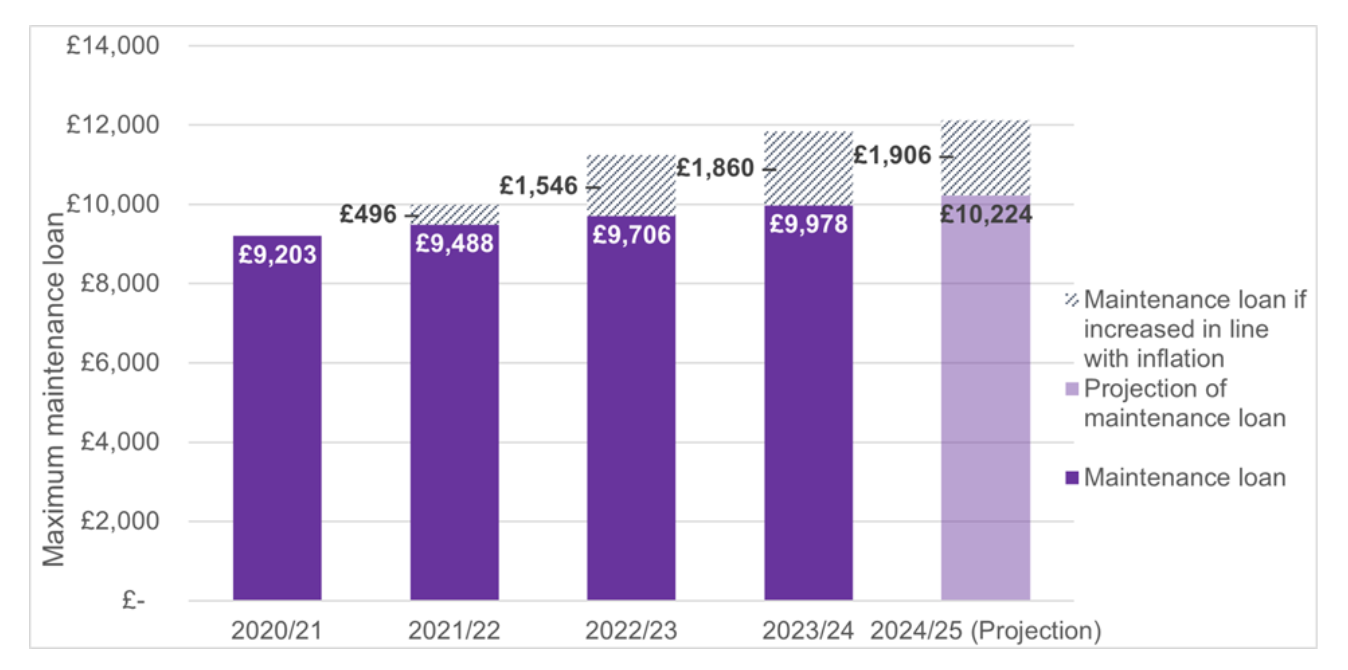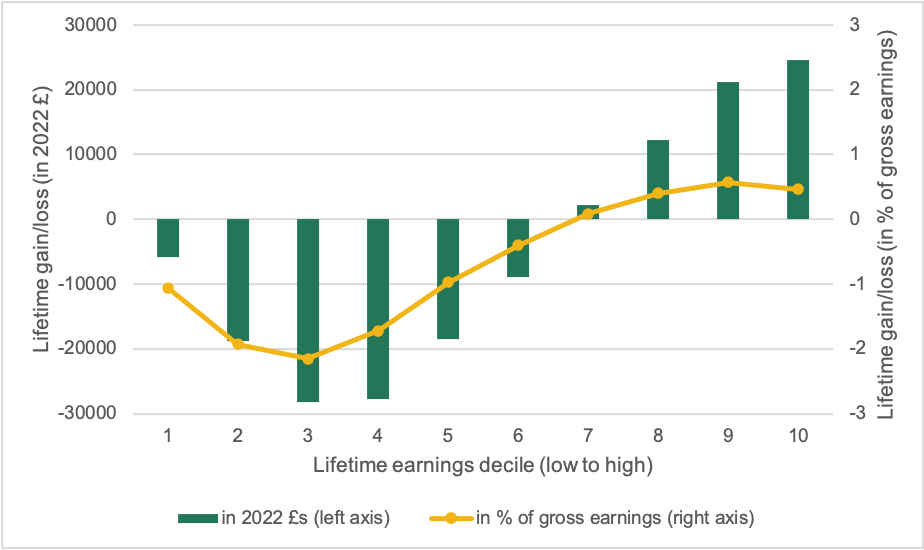Student support in England is being cut again in real terms
Jim is an Associate Editor (SUs) at Wonkhe
Tags
The statement from universities minister Robert Halfon was no surprise – it follows the now established (and pretty much completely discredited) method of using an Office for Budget Responsibility (OBR) projection of where RPIX (that’s all items in the itself discredited Retail Prices Index minus mortgage interest) will be in the first quarter of 2025.
It wasn’t a great way to calculate things back when inflation was bubbling along at just over nothing – but since the spikes in inflation we’ve seen over the past few years, it has now resulted in very significant cumulative compound impacts, because every time it turns out that the OBR was wrong, DfE never corrects the error.
As predicted by and pointed out by the Russell Group earlier in the week, for those on that max it means that they’ll be the best part of £2,000 a year worse off than they should be – all while almost every economist accepts that the basket of goods a student buys has almost certainly been rising faster than the published rates of inflation that DfE seem determined to ignore.

On top of all that, Halfon says nothing about the household income threshold of £25,000 over which students start to receive less than that maximum – that’s been stuck there since 2007, and as wages have risen (albeit not as fast as prices) it means that where we we once had about 60 per cent of FT UGs on the maximum a decade or so ago, these days it’s well under 3 in 10. It should be over £35,000 by now.
To top it up, Halfon has announced a tiny lengthening to his magic money twig – a one off £10 million will be added to the woeful student premium pot this year to cover both student mental health and hardship funding. This funding, he says:
“…will complement the help universities are providing through their own bursary, scholarship and hardship support schemes.
Of course “their own” bursary, scholarship and hardship support schemes are mainly funded through tuition fees – which he also takes the opportunity to confirm will be frozen at £9,250 for the seventh year in a row.
As I’d noted before here, that sounds to some like a good thing, given he frames it as “delivering better value for students and to keep the cost of higher education down”. He omits to mention that most students starting this September will end up paying much more for their higher education given the write off on student loans is now 40 years and the freezing of the repayment threshold as wages go up.

To be fair, not everyone will pay more – the inequitable distribution of the impact of those changes (driven by the trickery of a cut in interest rates on loans) is driving Labour’s Bridget Phillipson to promise to flatten these curves a bit, with the occasional hint that some sort of grant might reappear – but beyond a bit of redistribution, Labour seems to be seems to be some distance from offering a solution to the funding crisis that properly recognises the parlous state that booth student and university finances are now in. But for this government, the inescapable truth is that students are overall paying a lot more for a lot less.
The 2.5 per cent, by the way, also applies to both maximum disabled students’ allowance, maximum grants for students with child or adult dependants who are attending full-time undergraduate courses (who largely can’t get the government offer of free childcare for committing the cardinal sin of wanting to undertake education) and the postgraduate loans will be uprated by 2.5 per cent too – the inadequacy of which is noted elsewhere on the site today.
There are a couple of other twiddles – students who have been granted indefinite leave to enter (ILE) as a victim of domestic abuse, and their children who are granted ILE will also qualify for student support and home fee status. Halfon also confirms that home fee status and tuition fee support is being extended to British citizens born in the Chagos Islands, and their direct descendants who are also British citizens. In addition, students gaining settled status part-way through their course will qualify for student support and home-fee status for the remainder of their course.
One intriguing note in the statement is a restated yet still vague commitment that the government will extend the scope of loans for living costs, and grants for students with adult and child dependants, into the Lifelong Loan Entitlement (LLE) – making support available not just for full-time and part-time courses but also “for modules that require in-person attendance”. Distance learners still need not apply.
There’s no detail on what that means – the Augar review had effectively recommended that a 20 credit module should get a ninth of the main annual entitlement, and so on. Halfon says that “this will ensure that people will be able to develop new skills and gain new qualifications at a time that is right for them” – but if the main FT amount isn’t enough, it’s hardly as if chopping it up by credit will cover students’ costs either. We don’t even know if they’ll go that far.
If the government was really committed to maintenance funding flexibility, it would commit to a proper overhaul of student maintenance funding – moving towards the European norms of allowing students to complete the credits at a different pace if needs be.
The emerging picture of deep student poverty, grim housing conditions, students struggling to afford food and burdened by attempting to work full-time while undertaking a full-time course pretty much underscores the government’s polling numbers amongst students and young people.
Yet ironically, the more the sector subtlely shifts to making it still possible to pass a programme under these conditions, the more it undermines its own case on quality, the more it robs students of the ability to do all the other things that improve their mental health, employability and belonging, and the more it creates miserable new “norms” for what being student is.
As usual, this is a DfE announcement without any headline numbers on what the costs or savings are to the Treasury. We look next across to Wales to see if it will be able to maintain its very different system of no means test and linking the max to the living wage – which appears already to have had an impact on what it can afford on the postgraduate side.

